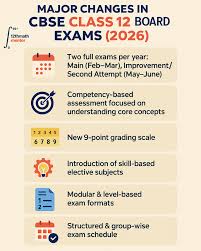Important Changes in CBSE Exam Rules for 2026

Introduction
The Central Board of Secondary Education (CBSE) is set to implement significant changes in its examination rules starting in the 2026 academic year. These adjustments aim to enhance the assessment process, reduce the stress on students, and better align with contemporary educational practices. As CBSE governs a vast number of schools across India, the implications of these changes are far-reaching, affecting millions of students and educators nationwide.
New Rules and Regulations
The key changes introduced by CBSE for the 2026 exams include:
- Introduction of Competency-Based Questions: A shift towards competency-based assessment has been emphasized, which will focus on evaluating students’ critical thinking and problem-solving abilities rather than rote memorization.
- Continuous and Comprehensive Evaluation(CACE): The CACE approach will be more rigorously implemented. This involves periodic assessments throughout the academic year, allowing for better tracking of student progress over time.
- Reduced Syllabus: In consideration of the challenges posed by the COVID-19 pandemic, the syllabus has been trimmed down. CBSE aims to ensure that students have a manageable amount of content to study in a given timeframe.
- Multiple Choice Questions (MCQs) and Application-Based Assessments: MCQs will comprise a significant portion of the question papers. Additionally, questions requiring practical applications of concepts will be included, encouraging deeper understanding.
- Options in Subjects: Students will be allowed to choose optional subjects more freely, providing them with the flexibility to pursue their interests and talents.
Implications for Students and Educators
These changes reflect a broader movement towards educational reform in India, where the emphasis is increasingly on skills and knowledge application rather than traditional learning paradigms. Students will need to adapt their study habits, focusing on understanding concepts deeply rather than memorization. For educators, these changes will require professional development and resource updates to effectively teach and assess under the new guidelines.
Conclusion
As CBSE moves toward these updated exam rules in 2026, students, parents, and teachers must stay informed and prepared for the shift. The new regulations aim not only to enhance educational outcomes but also to foster a more holistic approach to learning. It will be essential for stakeholders to engage with these changes actively and utilize resources provided by CBSE to ensure a smooth transition into this new era of education.









